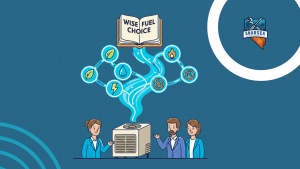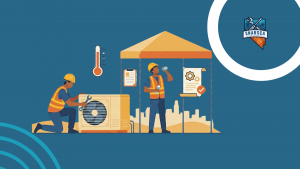Every type of building—whether it’s an office, a hospital, a house, or even a data centre—relies on heating, cooling, and ventilation to keep things running smoothly. That’s where HVAC engineering comes in. It’s a field that plays a big role in our daily lives, even if most people don’t realize it. In this article, we’ll explain what HVAC engineering really means, what professionals in this field do, and how you can build a career in it. By the end, you’ll see both the value of HVAC systems and the opportunities they create for engineers.
Importance of HVAC in Modern Infrastructure
HVAC systems are what keep buildings safe, comfortable, and liveable. They manage temperature, move fresh air around, balance humidity, and remove harmful pollutants from the air. Without them, places like schools, hospitals, airports, and data centres simply couldn’t function properly. That’s why HVAC engineering is so important—it focuses on designing systems that deliver top performance while saving energy and supporting sustainability in today’s world.
For those interested in training opportunities, explore our HVAC education programs to start building the right foundation.
Why HVAC Engineering Matters
Heating, Ventilation, and Air Conditioning engineering is important because it brings together comfort and sustainability. A poorly designed system can drive up energy costs, lower indoor air quality, or even create unsafe spaces. Skilled HVAC engineers prevent these issues by creating systems that keep buildings comfortable, cut down on energy waste, and meet environmental rules. This balance makes engineering in HVAC essential for both homes and large industrial facilities.
What is HVAC Engineering?
Definition and Core Principles
HVAC meaning in engineering refers to the science and practice of designing systems for Heating, Ventilation, and Air Conditioning. At its core, HVAC engineering combines thermodynamics, fluid mechanics, and material science to create systems that regulate indoor climate while optimizing energy use.
Key Functions: Heating, Ventilation, and Air Conditioning
- Heating: Ensures indoor warmth through systems like boilers, heat pumps, or furnaces.
- Ventilation: Manages air exchange, controls humidity, and removes pollutants for healthy indoor air.
- Air Conditioning: Provides cooling and dehumidification for comfort and equipment protection.
Together, these functions form the backbone of HVAC engineering and make it essential for every building type.
Role of HVAC Engineers in Different Industries
So, what does a HVAC engineer do on a daily basis? Their roles vary by industry:
- Construction: Designing HVAC systems for new buildings.
- Healthcare: Ensuring sterile, controlled air environments.
- Industrial plants: Managing ventilation and climate for safety.
- Data centres: Preventing overheating of sensitive equipment.
- Residential projects: Creating efficient, cost-effective comfort systems.
An HVAC engineer is not just a designer—they are a problem-solver who ensures reliability, safety, and sustainability.
Skills and Knowledge Required in HVAC Engineering
- Technical Skills: HVAC engineers must master thermodynamics, load calculations, CAD software, and system design.
- Analytical and Problem-Solving Skills: They diagnose performance issues, optimize efficiency, and develop innovative solutions for complex systems.
- Knowledge of Energy Efficiency and Sustainability: Today’s HVAC professionals must understand green building principles, renewable energy integration, and sustainable design standards.
Building these technical skills often starts with the right certifications—learn more about launching your HVACR career with certifications and skills.
Educational Pathway to Become an HVAC Engineer
- High School Preparation: A strong foundation in mathematics, physics, and basic engineering principles sets the stage for future success.
- Degree Options: Most HVAC engineers pursue degrees in mechanical or electrical engineering, though some universities now offer specialized HVAC programs.
Certifications and Licenses: Professional certifications strengthen credibility. Examples include:
- LEED Accreditation (sustainable building design)
- ASHRAE Membership (industry standards)
- EPA Certification (handling refrigerants)
These credentials help position you as a specialist in the field of HVAC.
Career Path and Job Roles in HVAC Engineering
- HVAC Design Engineer: Focuses on system layouts and equipment selection.
- HVAC Project Engineer: Manages projects from concept through installation.
- HVAC Maintenance & Service Engineer: Ensures systems run smoothly through inspections and troubleshooting.
- Emerging Roles: Specialists in smart and sustainable HVAC are in growing demand as technology advances.
This variety shows why many pursue how to become an HVAC engineer as a long-term career path.
Future of HVAC Engineering
- Green Building and Sustainable Practices: Sustainability is shaping the future, with HVAC engineers leading in energy-efficient systems, renewable energy integration, and eco-friendly refrigerants.
- Integration of Smart Technologies (IoT, AI, Automation): With AI, automation, and predictive maintenance, modern HVAC systems save energy and lower operating costs.
- Career Growth and Global Opportunities: With more cities developing and sustainability becoming a priority, HVAC engineering is in high demand. Professionals in this field can explore global roles in design, consulting, and energy-efficient solutions.
Conclusion
A career in Heating, Ventilation, and Air Conditioning engineering provides long-term job security, international opportunities, and the ability to make a real impact on energy savings and environmental protection. It’s a profession that combines technical skills with social value, making it both stable and rewarding. As technology evolves and the demand for greener infrastructure grows, the role of HVAC engineers will only become more important. If you’ve ever wondered what does a HVAC engineer do or are thinking about building a career in this field, you’ll find it offers a future full of growth and opportunities.
Related FAQs
Q What is HVAC engineering in simple terms?
HVAC engineering is the field that focuses on designing and maintaining systems that control heating, cooling, ventilation, and indoor air quality in buildings to ensure comfort, safety, and efficiency.
Q Why is HVAC engineering important for modern buildings?
HVAC engineering is essential because modern buildings depend on controlled temperature, clean air, and balanced humidity to function safely—especially in hospitals, offices, data centres, and industrial facilities.
Q What does an HVAC engineer do in real-world projects?
An HVAC engineer plans, designs, and optimizes HVAC systems, performs load calculations, selects equipment, ensures energy efficiency, and makes sure systems meet safety and environmental standards.
Q What skills are required to become an HVAC engineer?
HVAC engineers need strong knowledge of thermodynamics, system design, CAD tools, energy efficiency, and problem-solving, along with an understanding of sustainability and building regulations.
Q Which degree is best for a career in HVAC engineering?
Most professionals start with a degree in mechanical or electrical engineering, while some pursue specialized HVAC or air conditioning engineering programs for focused expertise.
Q Are certifications necessary for HVAC engineers?
While not always mandatory, certifications like LEED, ASHRAE membership, and EPA certification significantly improve career prospects and credibility in the HVAC industry.
Q What industries hire HVAC engineers?
HVAC engineers work across construction, healthcare, manufacturing, data centres, residential projects, and smart building development, making it a highly versatile career.
Q Is HVAC engineering a future-proof career?
Yes, HVAC engineering offers strong long-term growth due to increasing demand for energy-efficient buildings, green infrastructure, and smart HVAC technologies worldwide.
Q How does HVAC engineering support sustainability?
HVAC engineering supports sustainability by reducing energy consumption, improving indoor air quality, integrating renewable energy, and using eco-friendly refrigerants in modern building designs.


